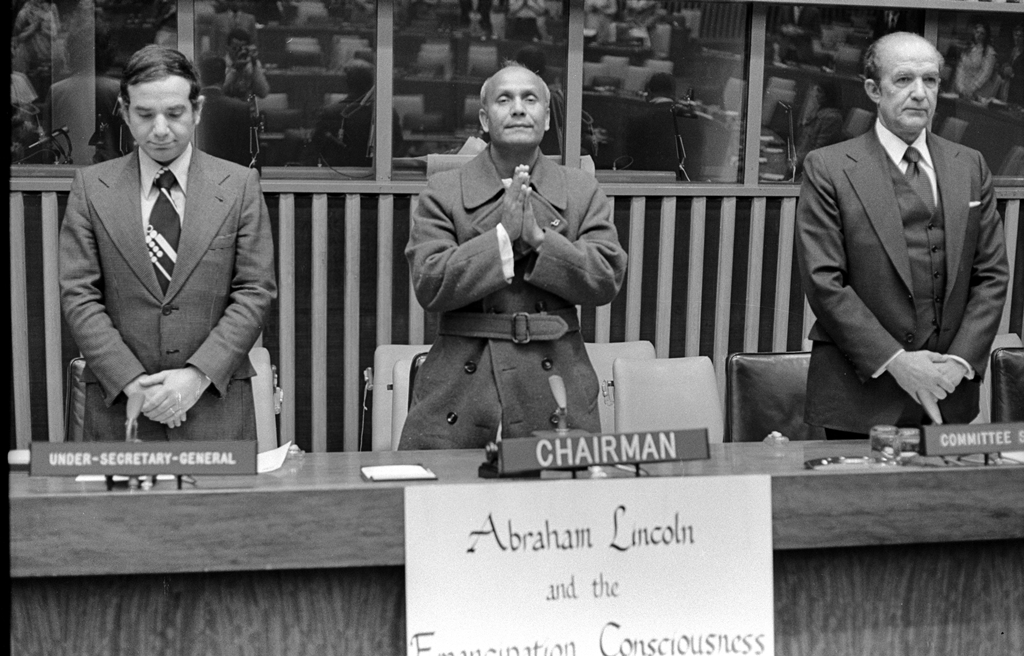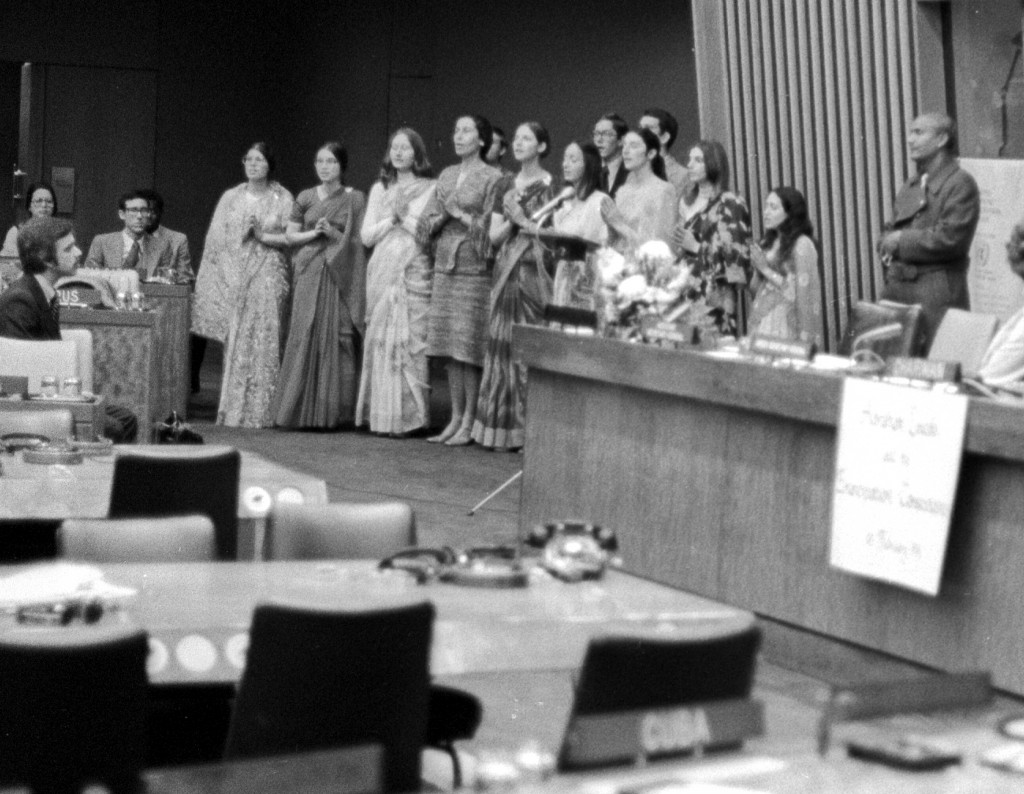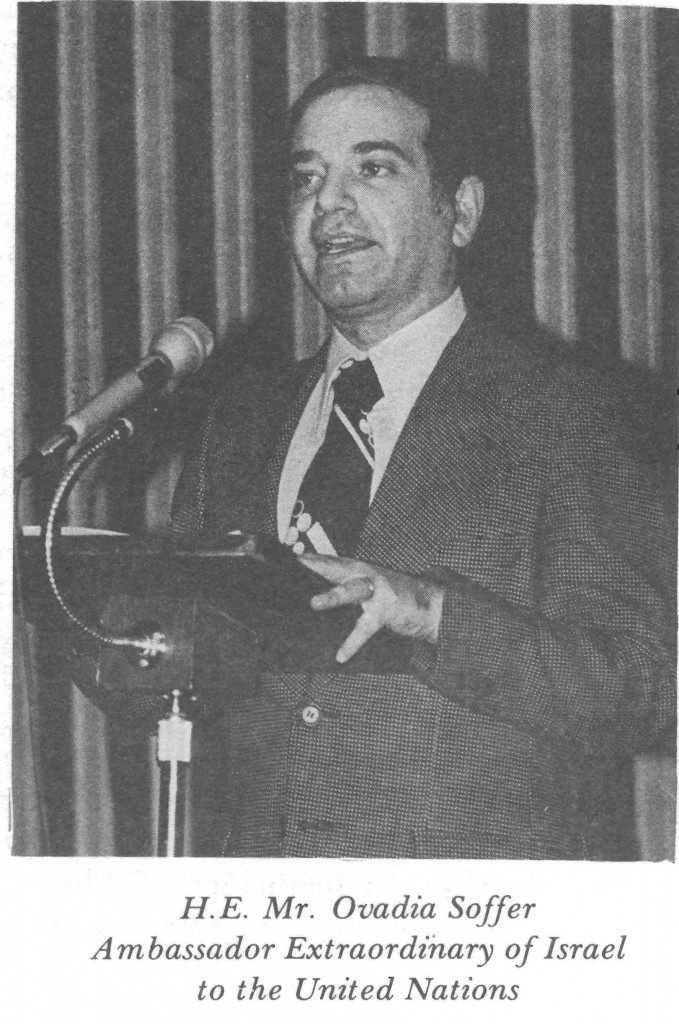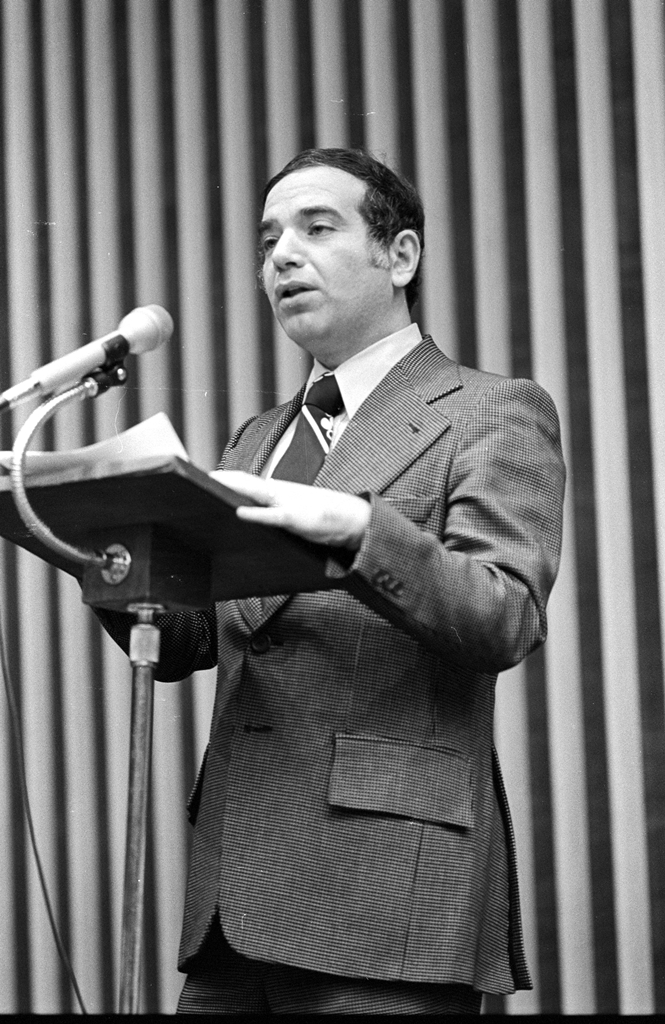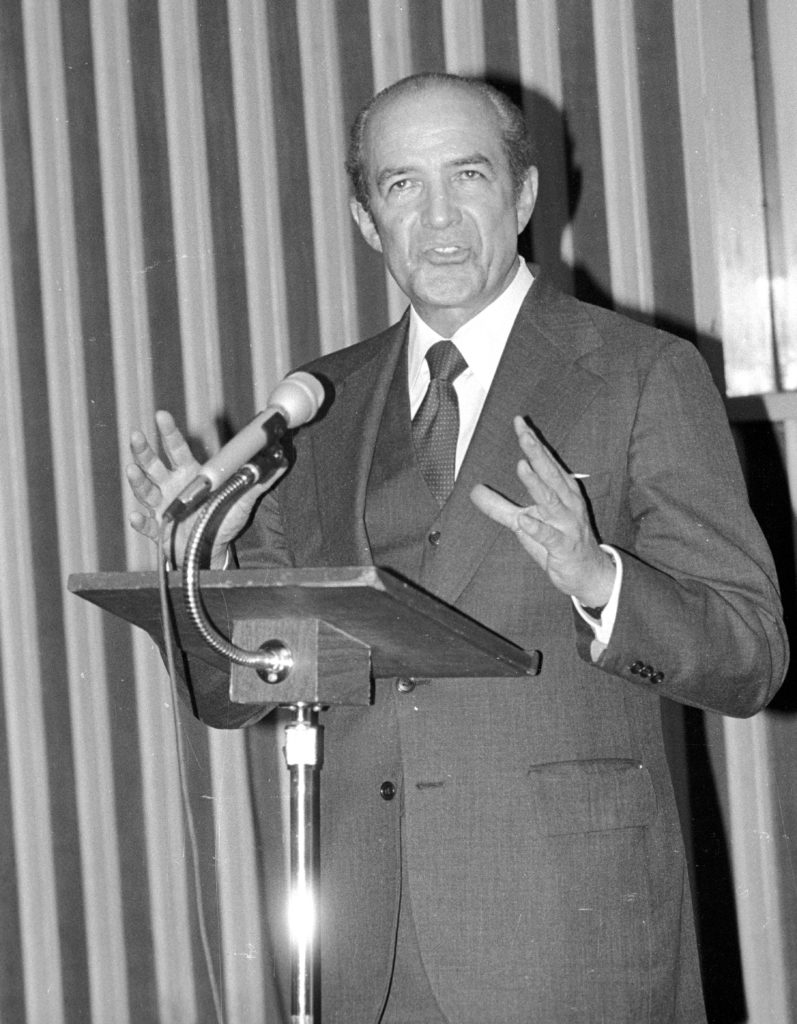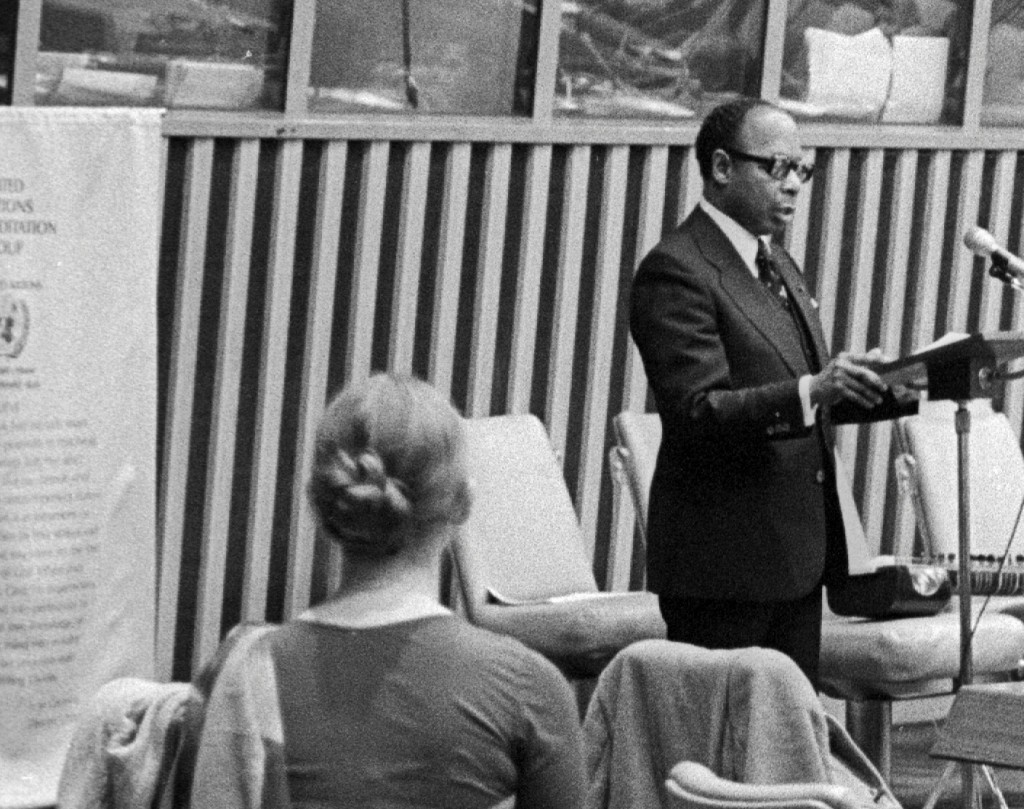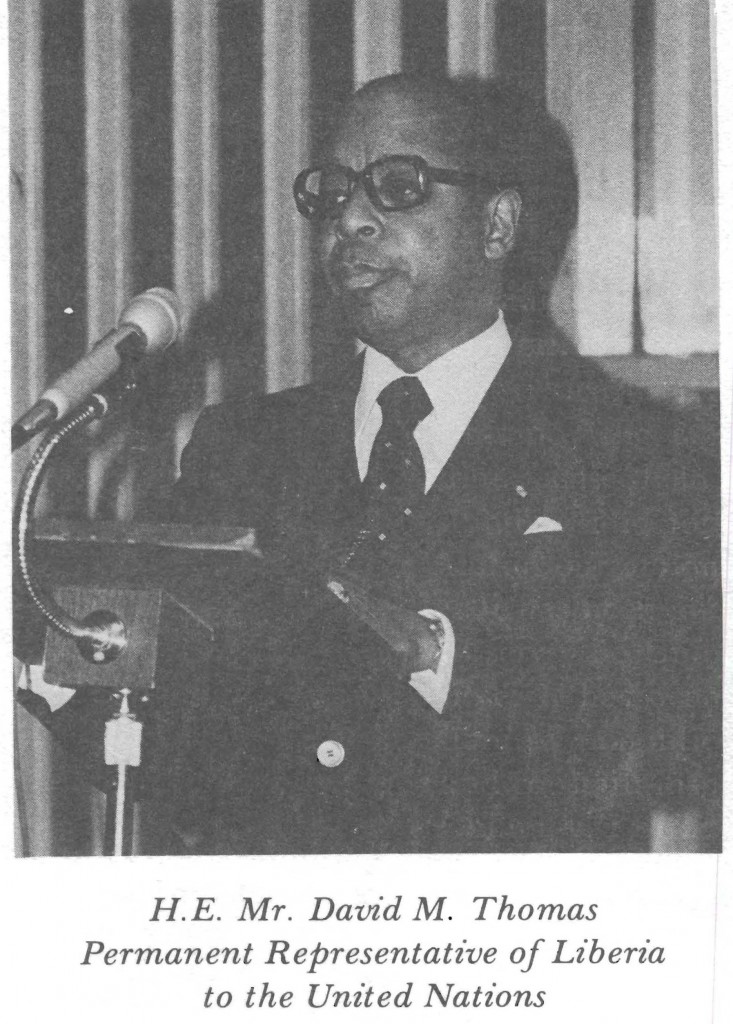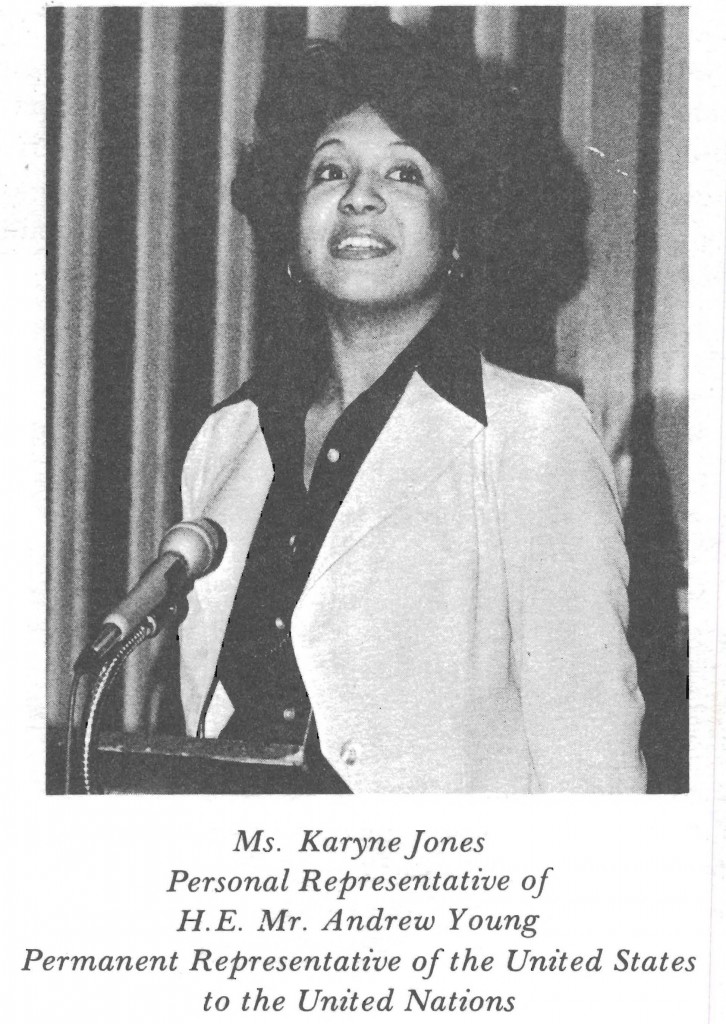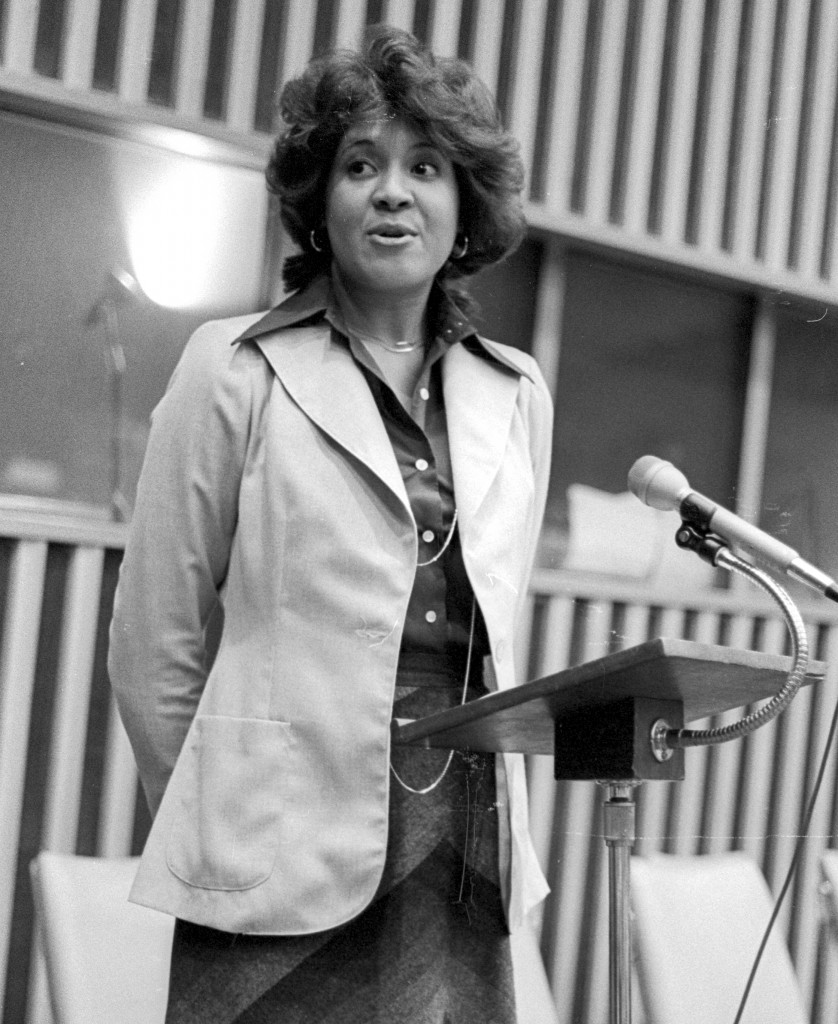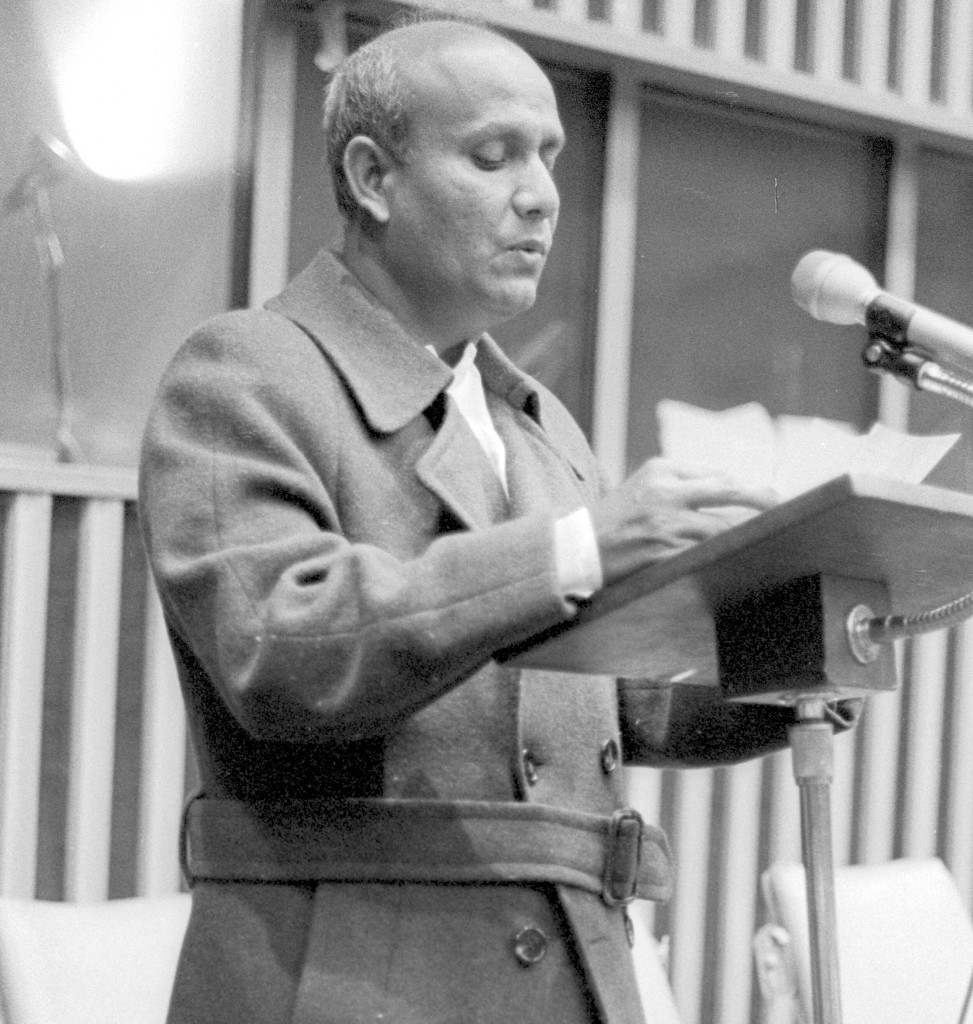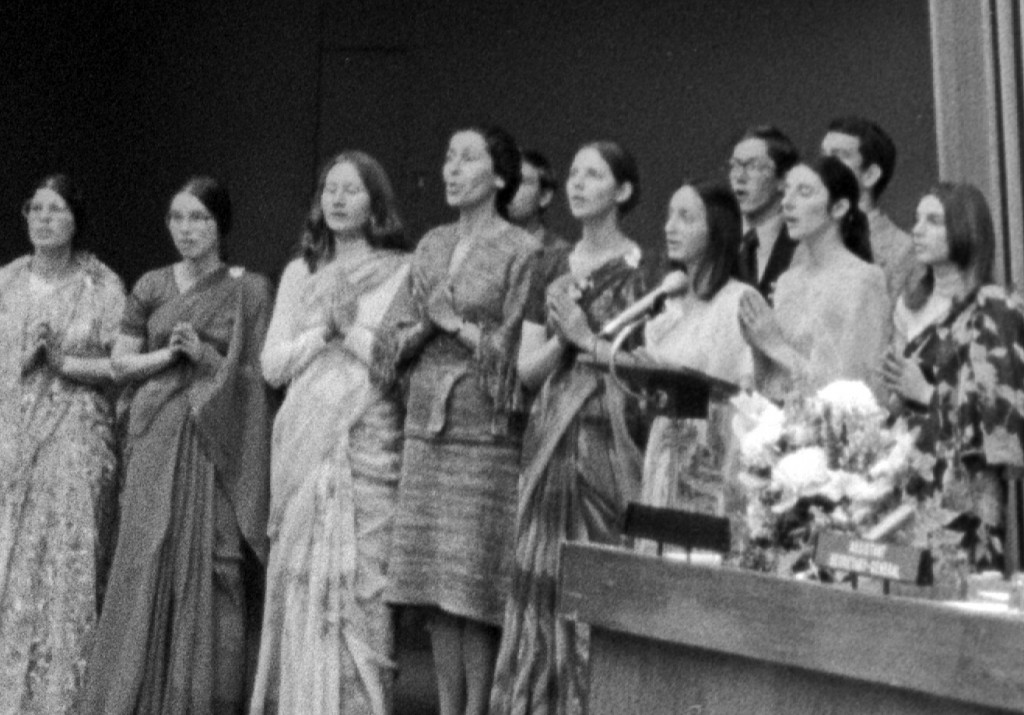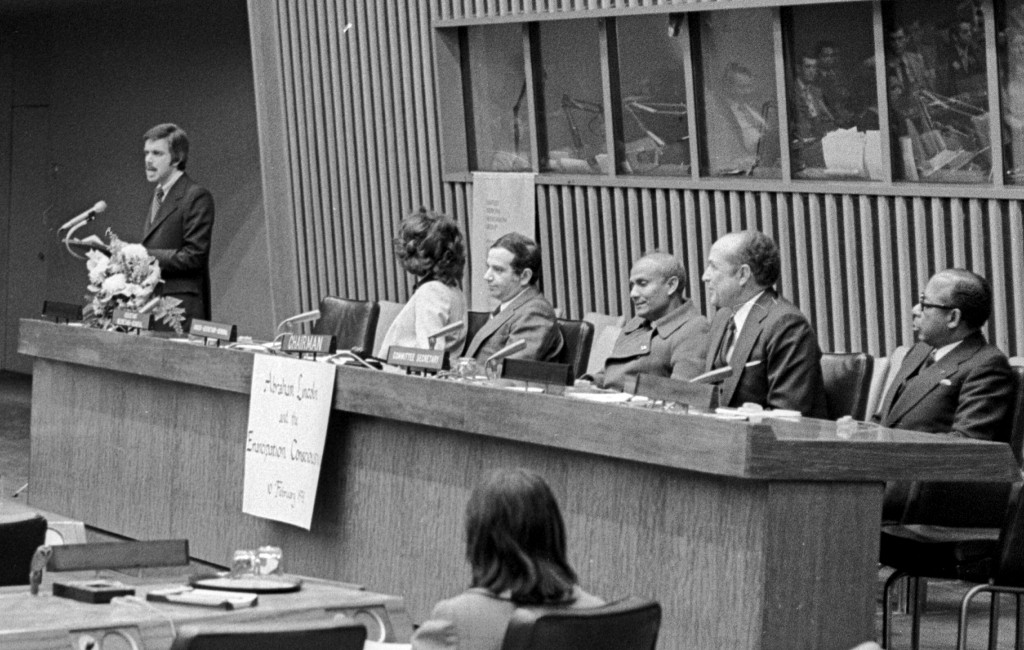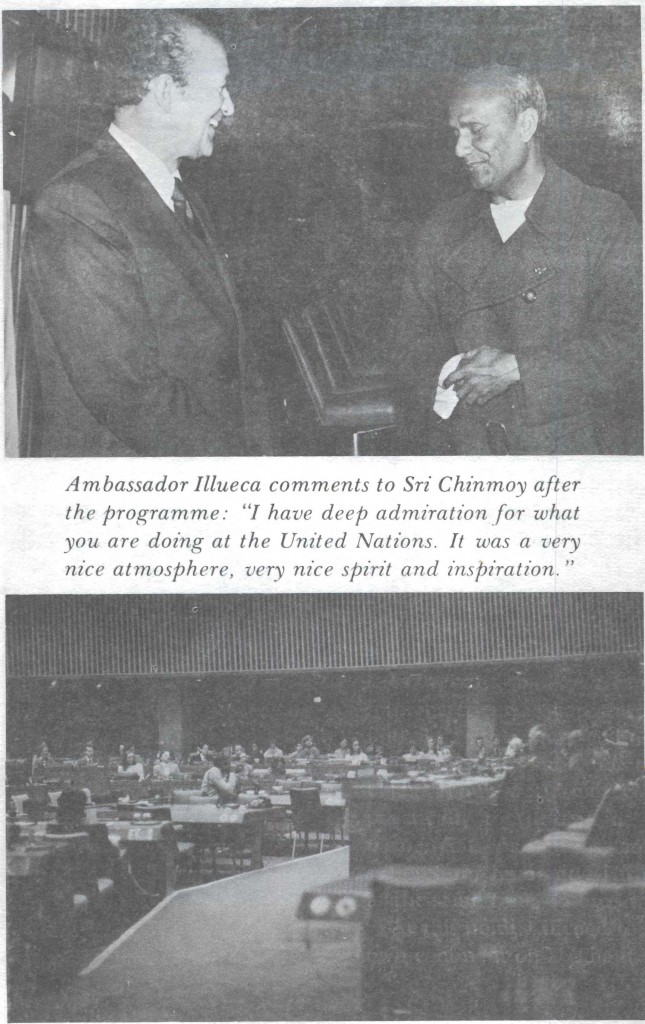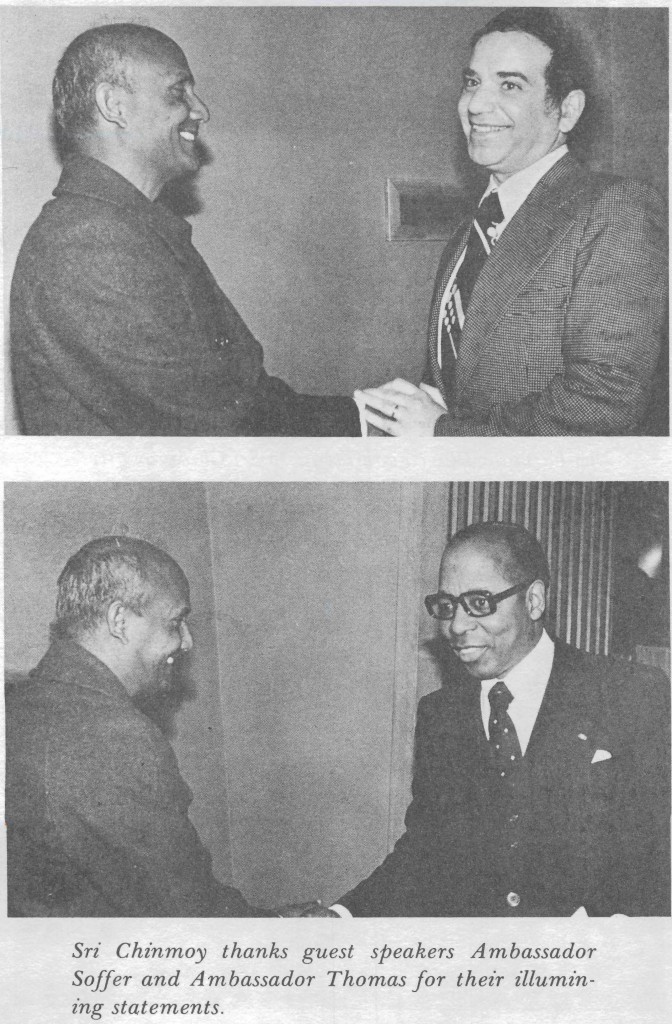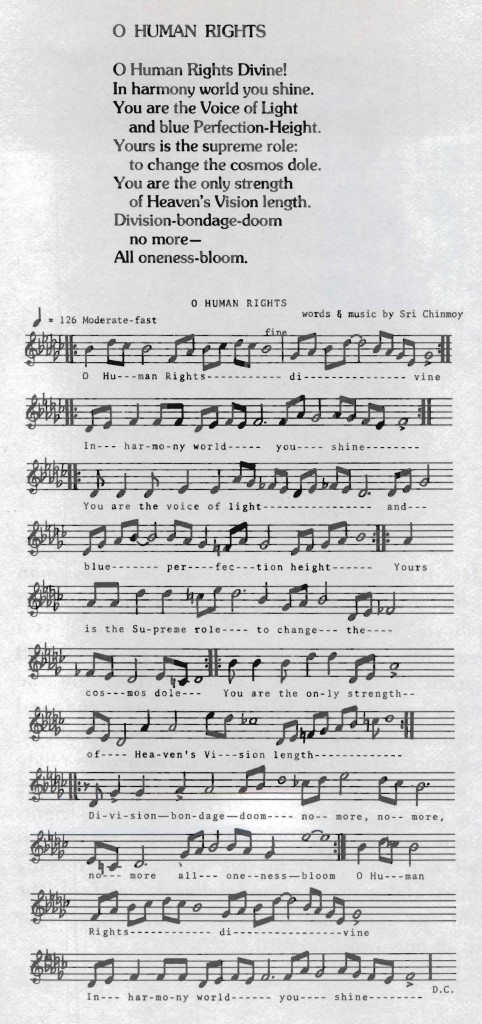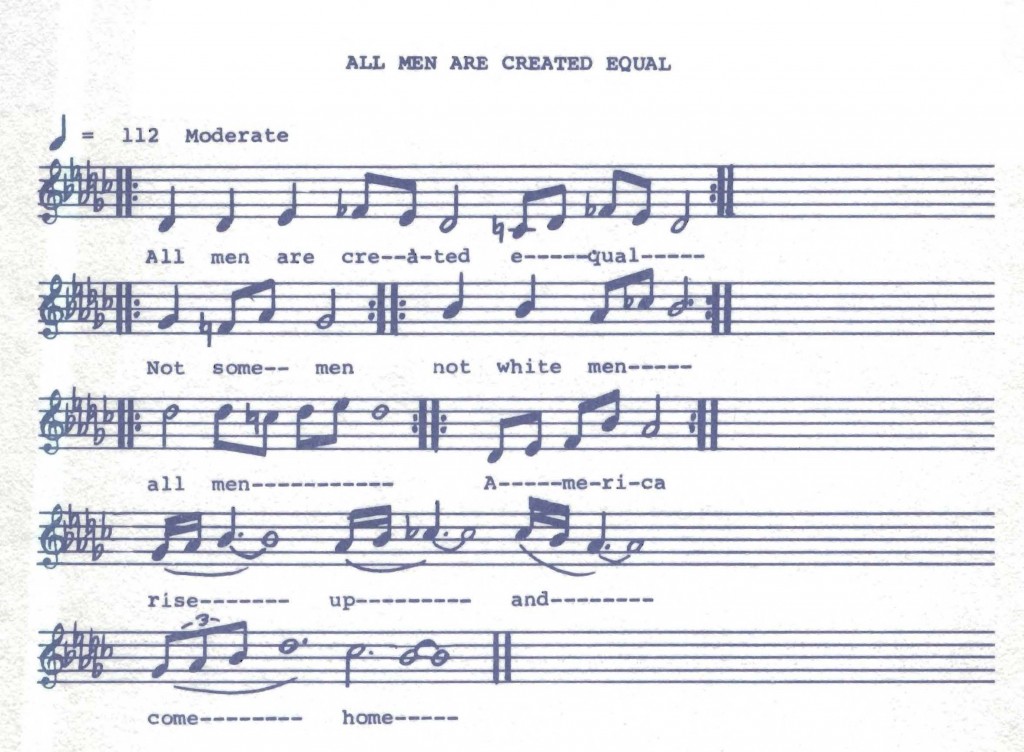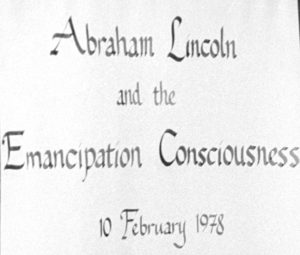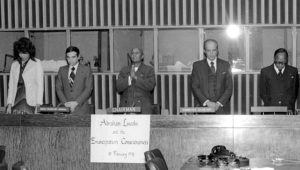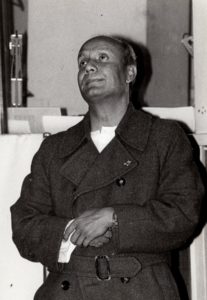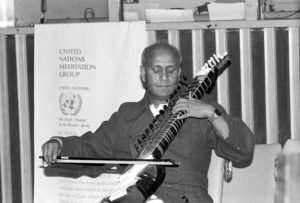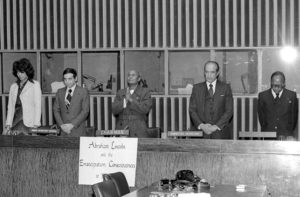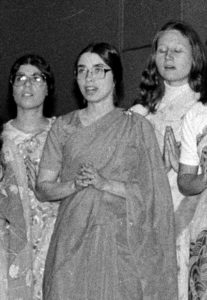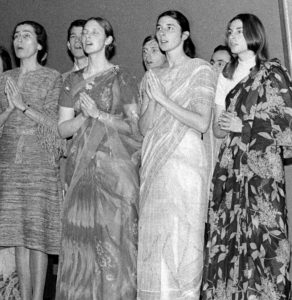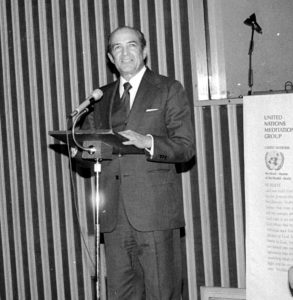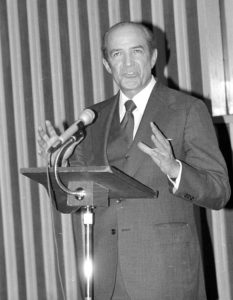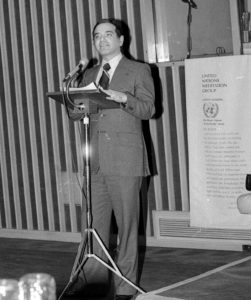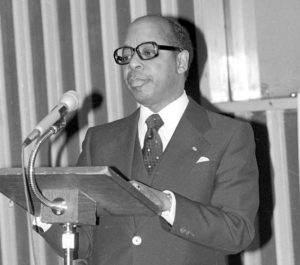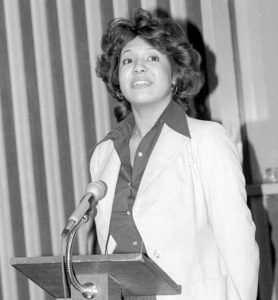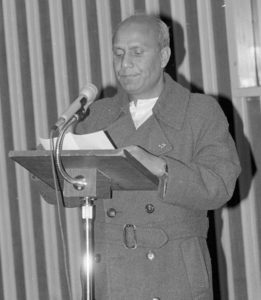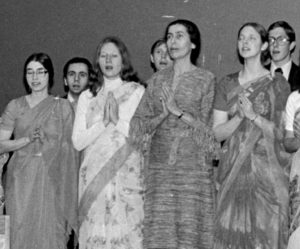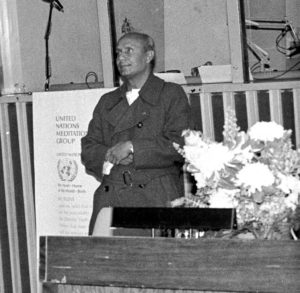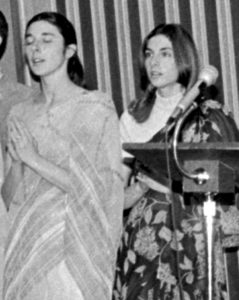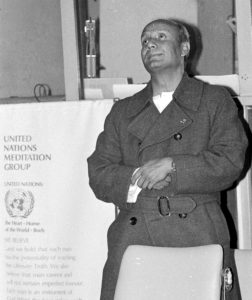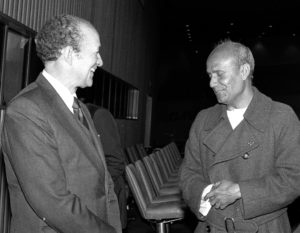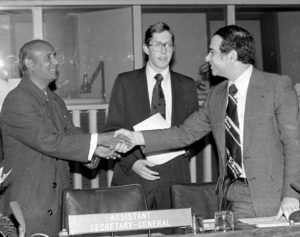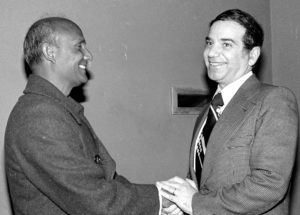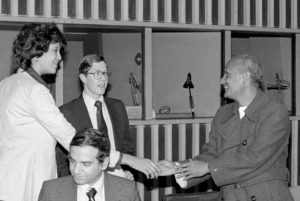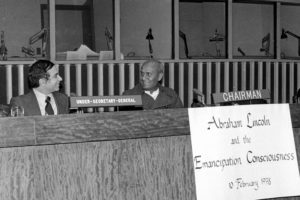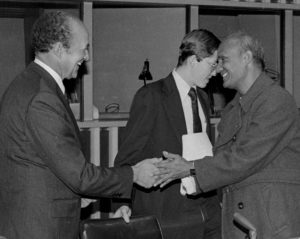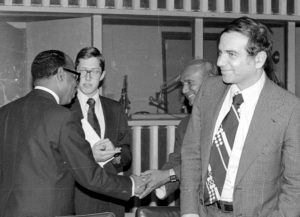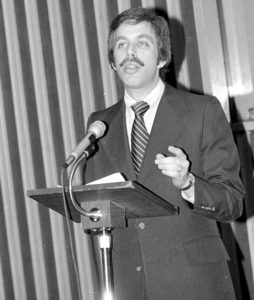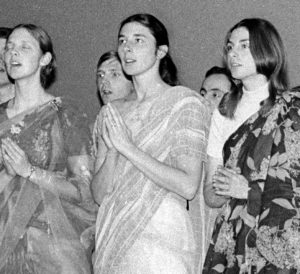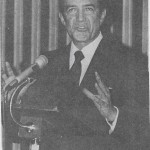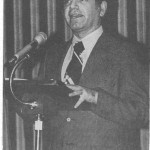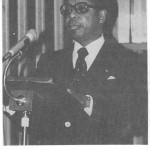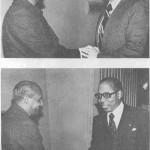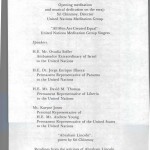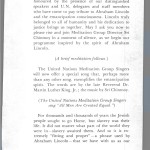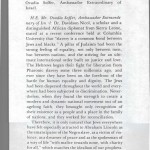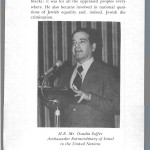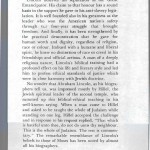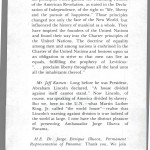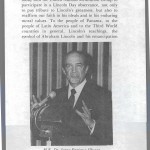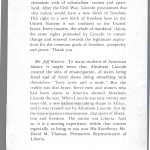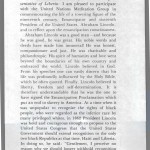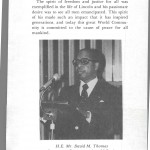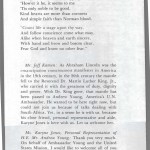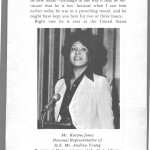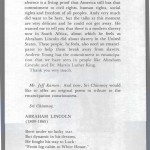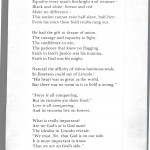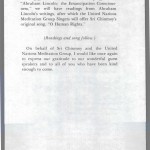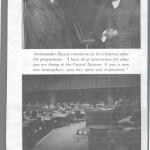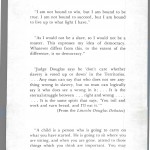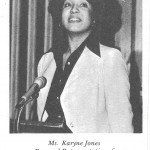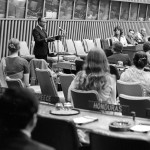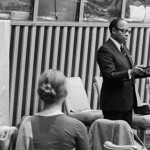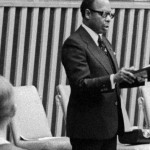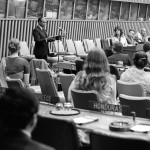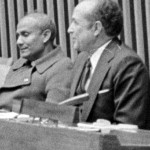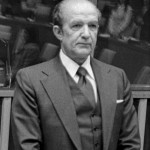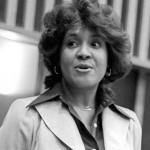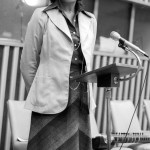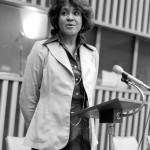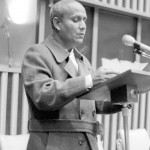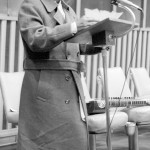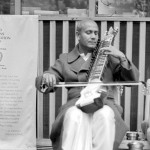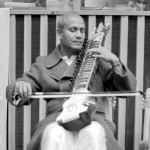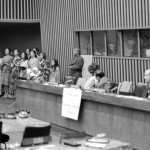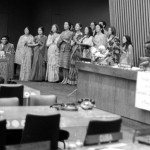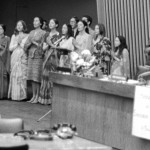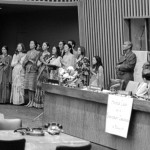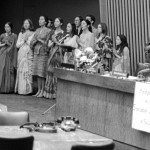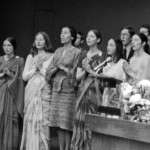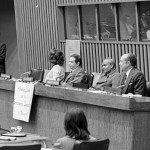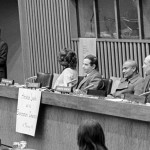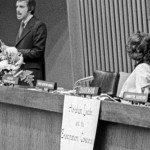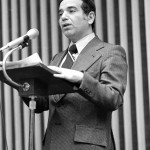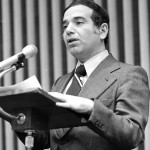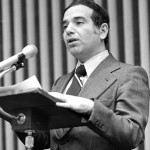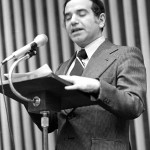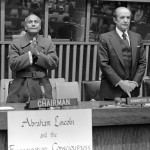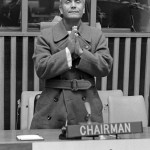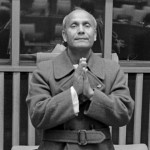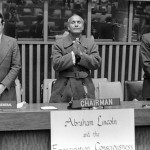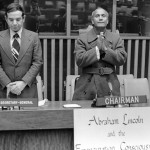Abraham Lincoln: The Emancipation Consiousness 1978 Feb 10 DETAILS
Filed under 2 or more | Tributes and Expressions of appreciation10 February 1978 Conference Room 4 United Nations, New York
Opening meditation and musical dedication on the esraj:
Sri Chinmoy, Leader of the Peace Meditation Group at the UN
Song: “All Men Are Created Equal”:
The Peace Meditation Group at the UN Choir
Speakers:
H.E. Mr. Ovadia Soffer, Ambassador Extraordinary of Israel to the United Nations
H.E. Dr. Jorge Enrique IlIueca, Permanent Representative of Panama to the United Nations
H.E. Mr. David M. Thomas, Permanent Representative of Liberia to the United Nations
Ms. Karyne Jones, Personal Representative of H.E. Mr. Andrew Young Permanent Representative of the United States to the United Nations
Poem “Abraham Lincoln”:
by Sri Chinmoy
Readings
from the writings of Abraham Lincoln
Song “O Human Rights” :
The Peace Meditation Group at the UN Choir
Reference Note:
- A summary “Abraham Lincoln: SUMMARY The Emancipation Consciousness” appeared in the print version of the 1978 “Devoted Report to the Secretary-General” see pp 7 – 8.
Mr. Jeff Kamen, WPIX-TV U.N. Correspondent (Programme Moderator) :
The Peace Meditation Group at the UN is honoured by the presence of our distinguished speakers and U.N. delegates and staff members who have come to pay tribute to Abraham Lincoln and the emancipation consciousness.
Lincoln truly belonged to all of humanity and his dedication to justice brings us together.
May I ask you now to please rise and join Meditation Group leader Sri Chinmoy in a moment of silence, as we begin our programme inspired by the spirit of Abraham Lincoln.
(A brief meditation follows .)
The Peace Meditation Group Choir will now offer a special song that , perhaps more than any other song, exemplifies the emancipation spirit. The words are by the late Reverend Dr. Martin Luther King, Jr. ; the music by Sri Chinmoy.
(The Peace Meditation Group Choir sing “All Men Are Created Equal. “)
For thousands and thousands of years the Jewish people sought to go Home, but slavery was their life . It did not matter what part of the world they were in – slavery awaited them. And so it is extremely “fitting and proper” – a phrase used by Abraham Lincoln-that we have with us as our first speaker this afternoon His Excellency Mr. Ovadia Soffer, Ambassador Extraordinary of Israel.
H.E. Mr. Ovadia Soffer, Ambassador Extraordinary of Israel:
Dr. Davidson Nicol , a scholar and a distinguished African diplomat from Sierra Leone, stated at a recent conference held at Columbia University that “slavery is a common bond between Jews and blacks.” A pillar of Judaism had been the strong feeling of equality , not only between men, but between nations, and the striving for an ultimate international order built on justice and love. The Hebrews began their fight for liberation from Pharonic slavery some three millennia ago, and ever since they have been on the forefront of the battle for human equality and dignity. The Jews had been dispersed throughout the world and everywhere had been subjected to discrimination. Nevertheless, when they found the strength to create a modern and dynamic national movement out of an agelong faith, they besought only recognition of their existence as a people and a place in the family of nations, and they worked for reconciliation.
Therefore, it is only natural that Jews everywhere have felt especially attracted to Abraham Lincoln as the emancipator of the Negro slave, as a victim of violence , as a dreamer of peace and as the spokesman of a way of life “with malice towards none, with charity for all ,” which matches the idealism of our prophets. 30 Lincoln did not confine his campaign for equality to blacks ; it was for all the oppressed peoples everywhere. He also became involved in national questions of Jewish equality and, indeed, Jewish discrimination.
H.E. Mr. Ovadia Soffer Ambassador Extraordinary of Israel to the United Nations
Lincoln deserves his reputation as the Great Emancipator. His claim to that honour has a sound basis in the support he gave to his anti-slavery legislation . It is well founded also in his greatness as the leader who won the American nation’s safety through the four-year struggle that brought freedom. And finally, it has been strengthened by the practical demonstration that he gave for human worth and dignity, regardless of religion, race or colour. Imbued with a humane and liberal spirit, he knew no distinction of race or creed in his friendships and official actions. A man of a deeply religious nature, Lincoln’s biblical training had a profound effect on his life and literary style and led him to profess ethical standards of justice which were in close harmony with Jewish doctrine. No wonder that Abraham Lincoln, as his biographers tell us, was impressed mostly by Hillel, the Jewish spiritu al leader of the second temple, who summed up this biblical-ethical teaching in his well-known saying. When a man came to Hillel and asked to be taught the whole of Judaism while standing on one leg, Hillel accepted the challenge and in response to his request replied, “That which is hateful unto thee, do not do unto thy neighbour. This is the whole of Judaism. The rest is commentary.”
The remarkable resemblance of Lincoln’s beliefs to those of Moses has been noted by almost all his biographers. Lincoln was a staunch supporter and believer in the principles which guided the Founding Fathers of the American Revolution, as stated in the Declaration of Independence, of the right to “life, liberty and the pursuit of happiness. ” Those principles changed not only the face of the New World, but influenced the history of mankind as a whole. They have inspired the founders of the United Nations and found their way into the Charter principles of the United Nations. The doctrine of equality among men and among nations is enshrined in the Charter of the United Nations and bestows upon us an obligation to strive so that men can live as equals, fulfilling the prophecy of Leviticus: ” . .. proclaim liberty throughout all the land unto all the inhabitants thereof.”
Programme Moderator : Long before he was President , Abraham Lincoln declared, “A house divided against itself cannot stand.” Now Lincoln, of course, was speaking of America divided by slavery. But we, here in the U.N. -what Martin Luther King, Jr. called “the world house” – realise that Lincoln’s warning against division is ‘ true indeed of the wor1d at large. I now have the distinct pleasure of presenting Ambassador Jorge Illueca of Panama.
H .E. Dr. Jorge Enrique Illueca, Permanent Representative of Panama:
Thank you. We join today with the Peace Meditation Group at the United Nations to participate in a Lincoln Day observance, not only to pay tribute to Lincoln’s greatness, but also to reaffirm our faith in his ideals and in his enduring moral values. To the people of Panama, to the people of Latin America and to the Third World countries in general, Lincoln’s teachings, the symbol of Abraham Lincoln and his emancipation consciousness are a permanent source of inspiration , strength and positive action against the anachronistic evils of colonialism, racism and apartheid.
(H.E. Dr. Jorge Enrique Illueca Permanent Representative of Panama to the United Nations)
After the Civil War, Lincoln proclaimed that this nation would have a new birth of freedom. This right to a new birth of freedom here in the United Nations is not confined to the United States.
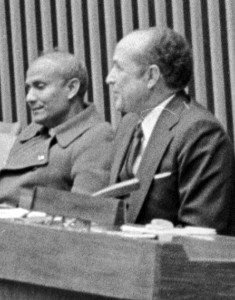 Every country, the whole of mankind, claims the same rights promoted by Lincoln to ensure change and renewal towards the legitimate aspirations for the common goals of freedom, prosperity and peace. ‘ Thank you.
Every country, the whole of mankind, claims the same rights promoted by Lincoln to ensure change and renewal towards the legitimate aspirations for the common goals of freedom, prosperity and peace. ‘ Thank you.
Programme Moderator: To many students of American history it might seem that Abraham Lincoln created the idea of emancipation, of slaves being freed and of freed slaves doing something with themselves – “forty acres and a mule. ” But the reality was that brave, fierce men and women who had been slaves in America showed Abraham Lincoln the way. When Lincoln was only twenty-one years old , a new nation was taking shape in Africa, and it was created not by Abraham Lincoln , but by the emancipation consciousness, that spirit of liberation and freedom . The nation was Liberia. And so, it is a moving experience, within that context especially, to bring to you now His Excellency Mr. David M. Thomas, Permanent Representative of Liberia.
H.E. Mr. David M. Thomas, Permanent Representative of Liberia :
I am pleased to participate with the Peace Meditation Group at the United Nations in commemorating the life of a towering figure of the nineteenth century, Emancipator and sixteenth President of the United States, Abraham Lincoln, and to reflect upon the emancipation consciousness.
Abraham Lincoln was a good man-and because he was good, he was great. His noble words and deeds have made him immortal! He was honest, compassionate and just. He was charitable and philanthropic. His spirit of humanity and love went beyond the boundaries of his own country and embraced the world. Lincoln believed in God. From his speeches one can easily discern that his life was profoundly influenced by the Holy Bible, which he often quoted. Finally, Lincoln believed in liberty, freedom and self-determination . It is therefore understandable that he was the one to have signed the Emancipation Proclamation which put an end to slavery in America. At a time when it was unpopular to recognize the rights of black people , who were regarded as the inferior race by many privileged whites, in 1862 President Lincoln was bold and courageous enough to propose to the United States Congress that the United States Government should extend recognition to the only two black Republics at that time, Haiti and Liberia. In doing so, he said: “Gentlemen, I perceive no reason why we should longer withhold recognition 36 from the two Negro Republics, Haiti and Liberia.” The spirit of freedom and justice for all was exemplified in the life of Lincoln and his passionate desire was to see all men emancipated. This spirit of his made such an impact that it has inspired generations, and today this great World Community is committed to the cause of peace for all mankind.
(H.E. Mr. David M. Thomas Permanent Representative of Liberia to the United Nations)
May I close with these appropriate words:
“How’er it be, it seems to me Tis only noble to be good,
Kind hearts are more than coronets And simple faith than Norman blood.
“Count life a stage upon thy way, And follow conscience come what may,
Alike when heaven and earth sincere, With hand and brow and bosom clear,
Fear God and know no other fear.”
Moderator: As Abraham Lincoln was the emancipation consciousness manifester in America in the 19th century, in the 20th century the mantle fell to the Reverend Dr. Martin Luther King, Jr. , who carried it with the greatness of duty, dignity and power. With Dr. King gone, that mantle has been passed to Andrew Young, America’s U.N. Ambassador. He wanted to be here right now, but could not join us because of talks dealing with South Africa. Yet , in a sense he is with us, because his close friend , personal representative and aide, Karyne Jones is here with us. Let us welcome her.
Ms. Karyne Jones, Personal Representative of H.E. Mr. Andrew Young :
T hank you very much. On behalf of Ambassador Young and the United States Mission, I would like to welcome all of you here. Ambassador Young unfortunately could not be here today – although in one way it may be fortunate that he is not, because when I saw him earlier today he was in a preaching mood, and he might have kept you here for two or three hours.
Right now he is over at the United States Mission, involved in the South African talks.
(Ms. Karyne Jones Personal Representative of H.E. lWr. Andrew Young Permanent Representative of the United States to the United Nations)
His absence is a living proof that America still has that commitment to civil rights, human rights, social rights and freedom of all peoples. Andy very much did want to be here, but the talks at this moment are very delicate and he could not get away. He wanted me to tell you that there is a modern slavery now in South Africa, about which he feels as Abraham Lincoln did about slavery in the United States.
These people, he feels, also need an emancipator to help them break away from slavery. Andrew Young has the commitment to emancipa· tion that we have seen in people like Abraham Lincoln and Dr. Martin Luther King. Thank you very much.
Programme Moderator : And now, Sri Chinmoy would like to offer an original poem in tribute to the emancipation consciousness.
ABRAHAM LINCOLN (1809-1865)
Born under no lucky star, But dynamic in his dreams, He fought his way to Luck: “From log cabin to White House.”
No soul on earth supreme over another – Equality every man’s birthright and treasure.Black and white, brown and red Make no difference – This nation cannot exist half-slave, half-free: From his voice these bold truths rang out.
He had the gift to dream of union, The courage and capacity to fight, The confidence to win, The patience that knew no flagging. Faith in God’s Justice was his stamina, Faith in God was his might.
Natural the affinity of vision-luminous souls, So Emerson could say of Lincoln : “His heart was as great as the world, But there was no room in it to hold a wrong.”
“Force is all-conquering, But its victories are short-lived.” Love is all-conquering, And its victories live on forever.
What is really important? Are we God’s or is God ours? The idealist in Lincoln reveals: “We trust, Sir, that God is on our side. It is more important to know That we are on God’s side.”
Programme Moderator :
To close our programme, “Abraham Lincoln: the Emancipation Consciousness,” we will have:
- readings from Abraham Lincoln’s writings, after which
- the Meditation Group at the U.N. Choir will offer Sri Chinmoy’s original song, “0 Human Rights.”
(Readings and song follow.)
Programme Moderator: On behalf of Sri Chinmoy and the Peace Meditation group at the United Nations, I would like once again to express our gratitude to our wonderful guest speakers and to all of you who have been kind enough to come.
Ambassador Illueca comments to Sri Chinmoy after the programme: “I have deep admiration for what you are doing at the United Nations, It was a very nice atmosphere, very nice spirit and inspiration, “
Sri Chinmoy thanks guest speakers Ambassador Soffer (above) and Ambassador Thomas for their illumining statements.
EXCERPTS FROM LINCOLN’S WRITINGS
“I am not bound to win, but I am bound to be true. I am not bound to succeed, but I am bound to live up to what light I have .”
“As I would not be a slave, so I would not be a master. This expresses my idea of democracy. Whatever differs from this, to the extent of the difference, is no democracy. ”
‘Judge Douglas says he ‘don’t care whether slavery is voted up or down’ in the Territories . . . . Any man can say that who does not see anything wrong in slavery, but no man can logically say it who does see a wrong in it; . .. It is the eternal struggle between . .. right and wrong . . _ . It is the same spirit that says, ‘You toil and work and earn bread, and I’ll eat it. ‘ ” (From the Lincoln-Douglas Debates)
A child is a person who is going to carry on what you have started . He is going to sit where you are sitting, and when you are gone. attend to those things which you think are important. You may adopt all the policies you please, but how they are carried out depends on him. He will assume control of your cities, states and nations . He is going to move in and take over your churches, schools, universities and corporations. All your books are going to be judged, praised or condemned by him. The fate of humanity is in his hands.”
Gallery 1 :
- (c) Copyrights Sri Chinmoy Centre
- (c) Copyrights Sri Chinmoy Centre
- 1978-02-feb-10-abraham-lincoln-un-sri-chinmoy-meditats-photo-scan-scaled.jpg
- (c) Copyrights Sri Chinmoy Centre
- (c) Copyrights Sri Chinmoy Centre
- (c) Copyrights Sri Chinmoy Centre
- 1978-02-10-01-singers-pramoda-tanima-surashri-ranjana-trishatur-nilima
- (c) Copyrights Sri Chinmoy Centre
- 1978-02-10-11-jorge-illueca-panama.jpg – abraham-lincoln-prog-un 05 MB
- (c) Copyrights Sri Chinmoy Centre
- (c) Copyrights Sri Chinmoy Centre
- (c) Copyrights Sri Chinmoy Centre
- (c) Copyrights Sri Chinmoy Centre
- (c) Copyrights Sri Chinmoy Centre
- 1978-02-10-27-singers-nayana-trishatur-chandika-surashri-pramoda-tanima-mohan.j
- (c) Copyrights Sri Chinmoy Centre
- (c) Copyrights Sri Chinmoy Centre
- (c) Copyrights Sri Chinmoy Centre
- (c) Copyrights Sri Chinmoy Centre
- (c) Copyrights Sri Chinmoy Centre
- (c) Copyrights Sri Chinmoy Centre
- (c) Copyrights Sri Chinmoy Centre
- (c) Copyrights Sri Chinmoy Centre
- (c) Copyrights Sri Chinmoy Centre
- (c) Copyrights Sri Chinmoy Centre
- (c) Copyrights Sri Chinmoy Centre
- (c) Copyrights Sri Chinmoy Centre
- (c) Copyrights Sri Chinmoy Centre
- 1978-02-10-27-singers-chetana-nayana-trishatur-chandika-pramoda-tanima-mohan.j
- (c) Copyrights Sri Chinmoy Centre
Gallery 2:
Click om image below for larger or different resolution photos:
- 1978-02-feb-10-abraham-lincoln-un-scpmaun-1978-02-27-pp-28-46_amb-illueca-panama.j
- 78-06-01-feb-20-abraham-lincoln-amn-thomas-liberia.
- 78-06-01-feb-20-abraham-lincoln-amn-thomas-liberia-crp-2
- 78-06-04-feb-20-abraham-lincoln-ckg-illueca-med-resize.jpg
– – – – –
